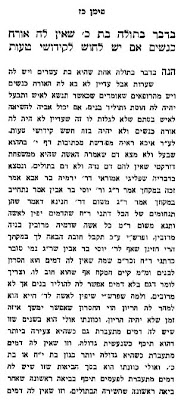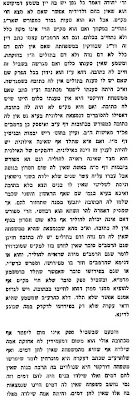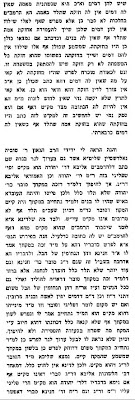The case is a girl who is already 20, but has not yet experienced menarche. She is about to get married and the girl's father wishes to know if he must inform the groom of this fact before the marriage. There are some doctors who say that once she is married and begins having intercourse, she will begin having her period.
Putting aside all halachic justifications mentioned in the teshuva, Rav Moshe Feinstein's conclusion is that he does not have to tell the groom, not even from a consideration of middat chassidut, but that she and her father should accept upon themselves that if she does not experience menarche or have children within 4 years, she should accept the get from her husband with no complaints, reservations, or claims on him.
One cannot pasken without understanding where the questioner is coming from, and we do not have the benefit of knowing this, in this anonymous teshuva. The question is framed as whether the father, rather than the girl, should reveal this, so perhaps this is from a background in which shidduchim are arranged between parents. Understandably, there might well be stigma if the shidduch is canceled, and if word about her condition gets out, such that she might never get married. This practical concern is certainly something that should factor in. It might all be well and good to be entirely honest, but not if it is to your detriment in a situation in which idiots will misinterpret it past what it actually is.
This framing of it as entirely above board, especially if she agrees to accept divorce with no claims after four years, is not necessarily true. Unfortunately, closed-mindedness when it comes to shidduchim extends to cases of divorce, such that some may consider a man or woman who is divorced to be "damaged goods." People will ask why he was divorced -- was it something about his personality? Or else they will not even ask the question, but will reject the shidduch out of hand without further consideration. If this fellow wishes to have a Jewish home life with a wife and children, a failed marriage with an infertile woman may condemn him to a life of bachelorhood, or at least significantly reduce his dating pool. As such, it is a somewhat mean thing to do to him, or at least to possibly cast him into by withholding this information. On the other hand, revealing this information before marriage may well eliminate this girl's chances of being married entirely, and this will be true for the present prospective groom as well as for any other. There are competing goals here.
Still, if we are to trust these doctors, there is nothing to worry about at all. (Unless they cast it as a "maybe.") If so, why need to appeal to gemaras at all? She will menstruate and be fertile. Unless there is still less likelihood of having children, or of having many children. Rav Moshe does consider in this teshuva, based on readings of the gemara, that she might have fewer children than other women, and whether this would lead to a mekach taut or not.
It is not our place to evaluate these doctors' words. It is certainly plausible. Studies have shown, e.g., that girls living with an unrelated male (e.g. a stepfather) on average experience menarche earlier than other girls. And other species ovulate in response to stimulation, and in fact gemaras discuss this phenomenon. The same might well be true for humans. This would be a separate post, but we will just take these doctors at their word.
Another issue is how to cast the case in the gemara that Rav Moshe applies. That gemara, on Ketubot 10b, reads:
Someone came before Rabban Gamaliel the elder [and] said to him, 'My master, I have had intercourse [with my newly-wedded wife] and I have not found any blood. She [the wife] said to him, 'My master, I am of the family of Dorkati, [the women of] which have neither blood of menstruation nor blood of virginity.' Rabban Gamaliel investigated among her women relatives and he found [the facts to be] in accordance with her words. He [then] said to him: Go, be happy with thy bargain. Happy art thou that thou hast been privileged [to marry a woman] of the family of Dorkati.What is the status of this woman, and what is meant by her family being Dorkati? Various commentators give various explanations. I will not offer my own explanation of the gemara at this time. It could mean that this woman has no blood from a torn hymen or menstrual blood but could still have children. It could mean that the women in the family are all barren. It could mean that some of the women in the family are barren. It could mean that the women in the family are not barren but have no blood. It could be from the father's side of the family or from the mother's side of the family.
What is [the meaning of] Dorkati? — A cut-off generation. —
R. Hanina said: Vain consolation Rabban Gamaliel offered to that man, for R. Hiyya taught: As the leaven is wholesome for the dough, so is blood wholesome for a woman. And one has [also] taught in the name of R. Meir: Every woman who has abundant blood has many children.
It has been said: R, Jeremiah b. Abba said: He [Rabban Gamaliel] said to him [the husband]: Be happy with thy bargain. But R. Jose b. Abin said: He said to him: thou hast been punished with thy bargain. We quite understand the one who says 'Thou hast been punished' with thy bargain — this is [according to the view] of R. Hanina. But according to him who says 'Be happy' [with thy bargain], what is the advantage [of such a marriage]? — He [the husband] does not come to any doubt regarding menstruation.
See Rashi's explanation and the Rama's explanation, and read the teshuva inside.
A few of my own insights. (I may be a bit off, so correct me where I am wrong. But, roughly:) Firstly, menarche is in almost all cases required in order to bear children. A woman ovulates and in preparation for this, a membrane develops on the uterine wall. If the egg released during ovulation is fertilizes, it attaches to this membrane on the uterine wall. Otherwise, the egg does not attach and the membrane breaks down. It then leaves the woman's body as she has her period.
A woman can get pregnant before menarche simply by becoming pregnant at the first ovulation. Thus, the membrane does not break down, but rather she becomes pregnant. Since marriage was much earlier in those days, this situation is not really so out of the ordinary. Theoretically, if nursing held off her period after her first birth, and then she became pregnant again at the next ovulation, a woman could go for years and years without menstruation but with several children. What about the blood from the torn hymen? If it was torn beforehand, or gave way easily with little and thus undetectable blood, we could have this as well. Thus, we can actually find a situation using modern science that could account for this. She would have to be very fertile, though.
She could also have very irregular periods, which would accord with the suggestions of Rabbi Meir that less blood accords with less children. If she had intercourse regularly and thus became pregnant every single, though infrequent time, she also would never see menstrual blood. Usually irregular periods are associated with difficulty conceiving, though.
Another possibility, but nothing I have seen in any literature, is that just as there are cells whose job it is to clean up waste in other part of the body, perhaps these women have some mutation such that they have some cells that attack and process the broken down membrane such that there is no period associated with it. This would be surprising.
Do we associate this condition with few children or with barrenness? This is a dispute.
Let us consider the idea that it indicated barrenness. The problem with saying this is that barrenness is hereditary. If your mother does not have children, neither will you. Yes, that is a joke, but it is true. If the girl's mother was barren, then the girl would not exist.
Therefore, she could not have gotten it from her mother. The problem with that is that a girl is formed by an XX -- an X from the father and an X from the mother. (XY is formed by an X from the mother and a Y from the father.) If she did not get it from her mother, since her mother was not barren, she must have gotten it from her father. But the father does not contribute a Y but rather an X, which came from his own, non-barren mother. Furthermore, if this is indeed something that is the case on the father's side of the family, that implies something like her great-grandfather, grandfather, and father all had daughters who were barren. But this makes no sense, since traits passed from father to son are on the Y chromosome, not the X chromosome. But these daughters are not receiving any Y chromosome, since they have two Xs. The situation would seem to be impossible.
Unless we consider some multi-genic situation, in which the X's being passed along by the fathers have a recessive gene which comes into play with a gene on the wives' side, which happens to be prevalent among women in that particular geographical area. This could lead to many such barren daughters.
Another possibility (mentioned in the teshuva but not in these terms, IIRC) is that some but not all women in this family are barren. Her mother might be normal, but her mother's sister is like her. As a result, there is something passed along on the X chromosome that, when exposed to certain environmental factors, or when combined with other genetic material, will result in her being barren and without seeing this blood.
The other possibility is that these woman actually do have children, even without seeing blood. This was discussed above.
(Another, undiscussed possibility, is that they see blood, but very little of it, such that it is possible to miss. And they also have children.)
Rav Moshe does not try to accord Rema and Rashi to modern medical science so as to figure out the actual case of the gemara. Though he discusses the possibilities, I do not think he necessarily feels that he needs to do this.
That is, whether Rashi or Rama or any other explanation of the gemara are plausible to modern medical science is not really a concern. Rather, these explanations form the historical medical-halachic positions which have developed. Even if scientifically inaccurate, the positions mapped out form important halachic precedent, which Rav Moshe can then apply to the current situation. Assuming she would be barren, would this be considered a mekach taut? We see it would not, from several readings of the gemara under the assumption that a family of Dorkati is barren. Assuming she is not, we have a precedent for a woman presently without menstrual blood who can nonetheless give birth, and thus can marry with no problem. We have precedent which we can extrapolate to this present situation.
One final interesting thing about this teshuva. In the middle of the discussion, he asks why one source bases his proof on what the Rif cites and does not cite, rather than a simple diyuk which can be made from Rashi.

He answers that this is because Rif is lehalacha, while Rashi really comes to give a local perush of the gemara, but not with intent towards pesak. I would note that this is an important idea, especially because there are certain sugyot where people try to make all sorts of plausible and even implausible deductions from Rashi's language, in order to come to some halachic conclusion as to what Rashi intended. One such example is by wigs, where Rashi comes to give a definition of wigs as something a woman with little hair wears so that she appears to have hair. Some try to claim that rather than giving a simple definition, so that you say "Oh! A peah nachrit is a wig!" that Rashi is restricting the permissibility of wigs to only these women. I think such is a bad diyuk, but furthermore that Rashi was never coming to try to declare halacha in the first place. And this statement echoes that.
Regardless, what follows is Rav Moshe's teshuva. The next teshuva is even more interesting, if I may say so. Read it all. For each of these, click on the image to see a much larger, and therefore actually readable, image:






2 comments:
The analysis supplied regarding the women of the Dorkati family, while perhaps sensitive to the issue addressed, is almost assuredly incorrect from a biological perspective.
The women of the Dorkati family do not menstruate (suggesting a genetic link) and Dorkati means "cut off generation" suggesting they are unable to bear biological children. By far the most probable explanation for this is that these women have Androgen Insensitivy Syndrome (AIS), an X linked recessive medical condition. This means that they inherited the condition from their mothers (in one-third of cases AIS occurs spontaneously, but with the Dorkatis we see members of a single family unit all with the same condition and therefore it would be inherited).
These women are chromosomally XY. This explains why their mothers (who are XX and carriers) do not have AIS while their daughters can. Women with complete AIS do not develop as males because their bodies are completely insensitive to the effects of androgens. They are female in appearance and, more importantly, female in psycho-sexual orientation. They do not have ovaries, do not menstruate, and connot conceive-no current reproductive technologies can change this.
They should be regarded as female for purposes of marriage, although if known in advance disclosure of such a condition is, I beleive, the only ethically sound approach given that their infertility will impact their partners. I speak from personal experience: I have AIS and disclose this fact almost immediately to men I date so that they can make an informed decision about whether to date me. I certainly would never marry someone without disclosing it as this can only lead to eventual heartache for all concerned.
There are many roads to parenthood, and a member of the Dorkati family, like a woman born today with the same condition, will need to find a loving and tolerant partner who can accept these facts. Love and tolerance aren't tested when everything goes "right," but instead are measured when confronting life's many challenges.
Sherri Groveman Morris, J.D., LL.M.
thanks!
excellent insight.
Post a Comment